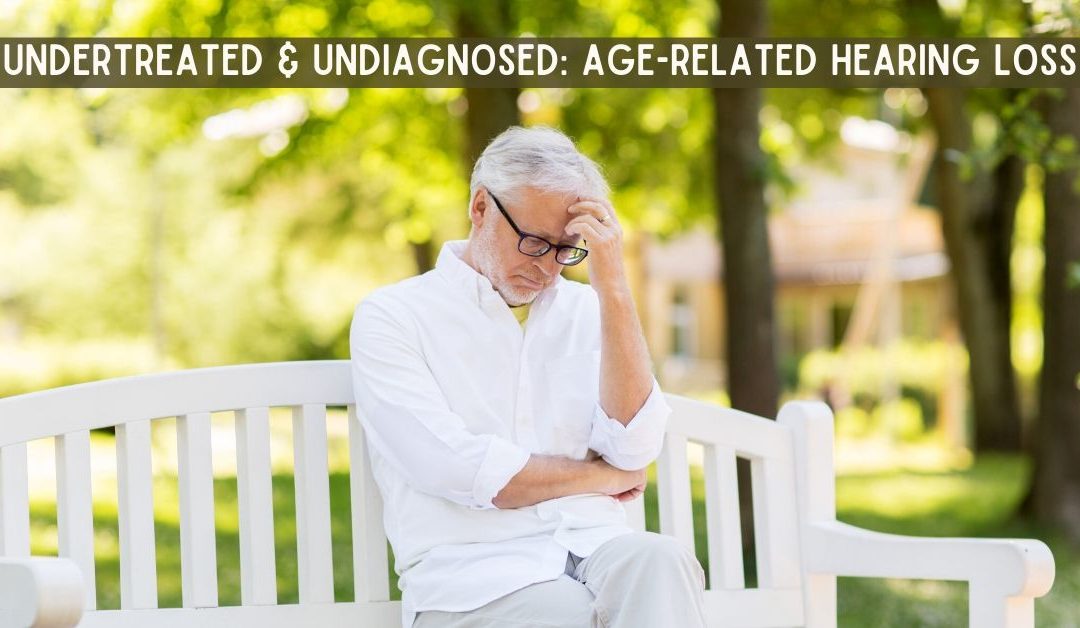Hearing loss affects people of all ages, but seniors have higher rates of hearing loss than younger adults. In fact, two thirds of all seniors over the age of 75 have hearing loss. Sadly, age-related hearing loss is often underdiagnosed and undertreated.
Age-Related Hearing Loss
As the name suggests, age-related hearing loss is caused by the natural aging process. Just as your joints get a bit stiffer with age, or you don’t have as much energy as you used to, your ears also age. Age-related hearing loss is a type of sensorineural hearing loss that affects the inner ear. Over time, the cells in the inner ear are damaged or get worn out from a lifetime of hearing sounds. As these cells deteriorate, you may begin to experience hearing loss. Sounds will seem muffled or fuzzy, and you may not hear some sounds at all.
Age-related hearing loss normally begins when you’re in your 50s and slowly gets worse over time. It may not be noticeable at the beginning, but over time it will be hard to ignore. Along with age-related hearing loss, you may experience tinnitus, a ringing or buzzing noise in your ears that often accompanies hearing loss.
Undiagnosed Hearing Loss
According to the Centers for Disease Control and Prevention, hearing loss is the third most common chronic condition in the US. In fact, hearing loss is even more common than cancer or diabetes.
Age-related hearing loss, also known as presbycusis, is one of the most common ailments affecting older adults, but it’s often undiagnosed. This is because age-related hearing loss is a very slow process, and your hearing abilities change very slowly. You won’t experience a sudden change in hearing, and you won’t perceive the small changes to your hearing health.
Seniors with hearing loss may not even be the first to recognize their hearing loss, since they’ve had time to adapt to the changes in their hearing. Friends and family members will be the first to comment that you have trouble hearing, or that you don’t follow conversations as easily as you used to. Family members will often complain that their loved one is turning up the TV volume, or that they don’t hear a comment from another room.
Age-Related Hearing Loss is Undertreated
Since age-related hearing loss is so gradual, it can be hard to admit that you have hearing loss. After all, you’ve managed to hear just fine until now. However, untreated hearing loss will become more noticeable as you ask people to repeat themselves, or blame others for mumbling. You won’t be able to follow conversations, or enjoy social events where there’s background noise.
Why is age-related hearing loss undertreated? It’s estimated that only 1 in 5 people who need hearing aids actually wear them. In that past, people assumed that hearing loss wasn’t a big deal, and didn’t take the time to learn about hearing loss, or to invest in hearing aids. Now we know that hearing loss leads to a lot of negative outcomes, such as higher rates of depression and social isolation, memory loss, and even dementia.
How to Treat Age-Related Hearing Loss
The best way to treat age-related hearing loss is by wearing hearing aids. Unlike the hearing aids you might be imagining, today’s devices are extremely powerful, and smaller than ever before. Some devices will even sit in the ear canal, and are impossible to spot. Hearing technology has improved over the last few years, and today’s devices pack a lot of punch. Hearing devices have programs that help you focus on speech and enhance the clarity of sound, not just increase the volume.
You can also find hearing aids that connect wirelessly to your phone using Bluetooth technology, or that have T-coils to help you hear clearly in auditoriums. Other great features you can enjoy with modern hearing aids include automatic adjustments to programs and settings, or even geotagging that lets you save exact settings for the locations where you spend the most time.
The best thing you can do for your hearing health is to schedule regular hearing tests. Adults over the age of 50 should have hearing tests every two to three years, while adults over 65 should have annual hearing tests to monitor their hearing health.


